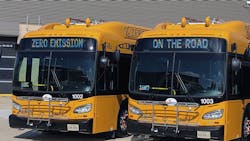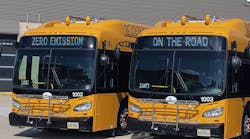New NVTC report highlights importance of public transit to the environment
A new report from the Northern Virginia Transportation Commission (NVTC) finds the use of public transit in northern Virginia reduces up to 160,000 metric tons of carbon dioxide emissions each year and that diesel-fueled buses provide greater benefits to the environment than people driving in cars, SUVs and light trucks.
The "Climate Benefits of Transit in Northern Virginia" report concludes that while personal vehicles are a major cause of pollution, riding trains and buses can mitigate the emissions.
Key findings
- The use of public transit in Northern Virginia reduces 120,000 to 160,000 metric tons of carbon dioxide annually.
- All bus fuel types, even diesel buses, are a much greater climate option than using cars.
- While electric cars might eventually produce fewer emissions per mile than fossil fuel buses, electric cars need to make up a much larger proportion of on-road vehicles before other bus fuel types become better options.
- There are opportunities for the region’s jurisdictions and transit agencies to learn from each other when it comes to developing policies that consider how transit could benefit the environment.
Recommendations
"Transportation is the number one source of greenhouse gas emissions in the United States, with more than half of those emissions generated by cars, SUVs and pickup trucks," said NVTC Senior Program Manager Xavier Harmony, who co-authored the report with Senior Program Analyst Sophie Spiliotopoulos. "Despite improvements in vehicle fuel efficiency, transportation emissions have been creeping steadily upward for decades."
The report makes the following recommendations to continue to reduce greenhouse gas emissions in the short-, medium- and long-term:
- Increase ridership (shorter-term)
- Reduce miles and hours when a transit vehicle is not taking passengers, also known as deadheading, where possible (shorter-term)
- Increase the amount of transit in the region (medium-term)
- Speed up buses using bus priority infrastructure and policies (medium-term)
- Transition to zero-emission buses (longer-term)
"As northern Virginia continues to attract new residents and businesses, we need to think about ways to make it a healthy region for our children and grandchildren. This report bolsters what we already know," said NVTC Chair Matt de Ferranti, "Encouraging as many people as possible in our region to ride public transit is good for the environment. It reduces greenhouse gas emissions and traffic congestion, helping save our climate for generations to come."



